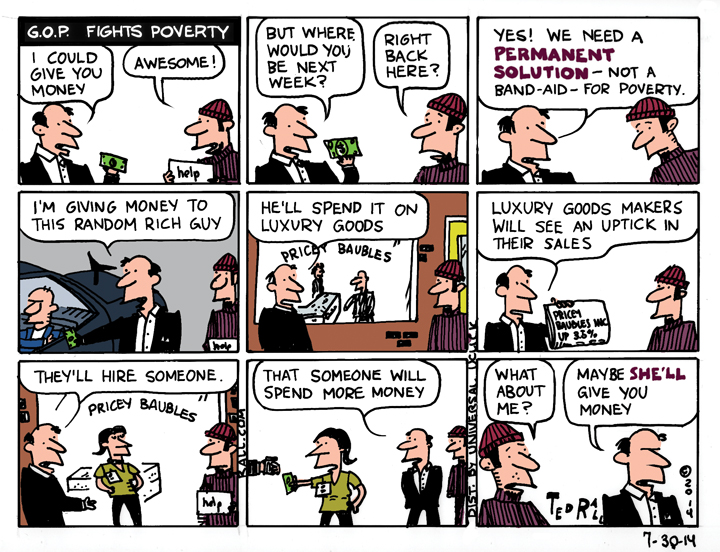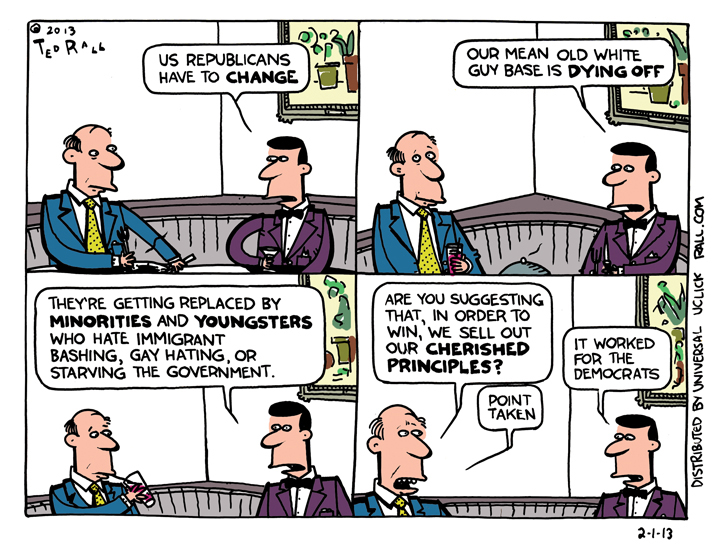Conventional wisdom says that the Republican field is deep. Certainly, there are a lot of them. Scratch the surface on policies, however, and you find a lot of similarities…except for Donald Trump.
Why The GOP Letter To Iran Is Such A Huge, Major Deal
Originally published by Breaking Modern:
In a supremely strange move this week, 47 Republican senators took the unprecedented step of directly writing the leader of a foreign government in order to get in the way of a US president’s foreign policy talks with it. This is even though the US constitution, as any ninth grader has learned in social studies, puts a sitting US president in charge of foreign policy.
In its letter to the Iranian government, the GOP senators said: Don’t bother cutting a deal with President Obama and the United States right. Because, it said, the next “Republican president” will just reverse any agreement “with the stroke of a pen.”
This astounded news watchers around the world. Here’s why this development is so disturbing and why you should follow these developments closely.

But first, let’s back up and look at the Iranian reaction to the letter. It certainly didn’t do much to dissuade Iranian Foreign Minister Mohammad Javad Zarif from continuing with US talks to limit nuclear weapons production in Iran.
In a public statement, Zarif said he wasn’t buying it, but that he now has a stronger understanding of constitutional separation of powers under the American system than the signatories of the letter do.
Confused in the USA
As American legal scholars and political analysts struggle to get their heads around the GOP letter and its implications, Iran’s Zarif offered some theories. The Republican senators, Zarif said, must “not understand international law,” said Zarif, a professor of international law, and they must not understand the US constitution, either. Either they are not “fully cognizant of the nuances of their own constitution when it comes to presidential powers in the conduct of foreign policy.”
Ouch. And he’s right, as any ninth grader making a B in the social studies could tell you straight away.
Under law and by custom, the executive branch is in charge of foreign policy – including treaty negotiations, which this is not.
While the Senate specifically and the legislative branch in general have a consulting role to play, especially in the ratification of treaties, the kind of agreement being contemplated between Obama and Iran is not one of them. In fact, President Bush arrived at a similar deal with Libya, which did not require congressional consent.
Furthermore, presidents historically honor their predecessor’s international promises regardless of their political party. They have to, for all the obvious reasons.
So, bottom line, Sen. John McCain (R-AZ)’s notorious “bomb bomb bomb bomb Iran” plan will have to wait.
A Sign of Political Decline?
US lawmakers, for the first time anyone can remember, have publicly set out to undermine a sitting president during talks with a longtime adversary are astounding.
US Vice President Joe Biden accurately characterized the implications in this statement:
This letter sends a highly misleading signal to friend and foe alike that our commander in chief cannot deliver on America’s commitments — a message that is as false as it is dangerous.”
Of all people, the Ayatollah Ali Khamenei, Iran’s supreme leader, got right to the heart of the issue.
The GOP letter, the Ayatollah said, is “a sign of a decline in political ethics and the destruction of the American establishment from within.”
Don’t All Countries Stick To Foreign Commitments Post Elections?
Forgotten in this tempest of partisan lunacy is a fact alluded to in Khamenei’s statement: “All countries, according to the international norms, remain faithful to their commitments even after their governments change.”
Iran knows this well. Why? Because if Iran hadn’t followed such “international norms,” it would be free to develop any nuclear weapons program they felt like, no matter what it had agreed to in the past. And that means there would never be grounds for the United States or any other country to impose economic sanctions on Iran.
This is why international observers in the US, Europe and in the Middle East are so blown away by the GOP letter.
The agreement that prohibits an Iranian nuclear weapons program is the Nuclear Non-Proliferation Treaty. Iran signed it in 1968, and agreed to an inspections regime in 1974.
Ah, but that was under the rule of Shah Mohammad Reza Pahlavi.
The Shah was deposed in the 1979 Islamic revolution. The new government, the one currently led by Ayatollah Khamanei, nevertheless agreed to honor the international agreements signed by its predecessor, including the Nuclear Non-Proliferation Treaty.
And this makes the Republican letter still more outrageous.
Why You Should Care
What you are watching now is a most bizarre spectacle. You’ve got the United States playing holier than thou, screaming to high heavens that Iran can’t be trusted and that the country poses a grave danger of developing nuclear weapons that it will sell or fire at Israel or even at us.
Yet Iran is and has been honoring a nuclear treaty signed by an entirely different government, one that was overthrown back in 1979.
But now you have 47 lawmakers contacting the leader of a foreign government directly, saying that, unlike Iran, anything the President of the United States negotiates with foreign countries becomes null and void when he leaves office. And this is not even after a full-fledged revolution, mind you, but just after an election.
Whatever moral high ground as United States once held on the international stage is collapsing into a deep deep valley. I’ll be watching these developments for you in the days and weeks to come.
The GOP Finally Takes on Poverty
Republican Congressman and former vice presidential candidate Paul Ryan, infamous for budget proposals that denigrate and starve the downtrodden, has changed tack with an anti-poverty proposal that actually includes safety-net items like expanding the Earned Income Tax Credit. Still, the Republican Party remains in thrall to trickle-down economic theories that, if they worked, would take years to help poor people who need money now.
SYNDICATED COLUMN: Is the GOP Doomed? Slightly Less than the Dems
In a Two-Party System, the Loser is Us
Stalin called bourgeois parties “the dancing bears of social democracy.” Toothless and undignified distractions, these non-movements personify the function of electoral politics—to channel the energies of the oppressed into bullshit discussions about trivia and inanities.
Uncle Joe’s hilariously inelegant phrase comes to mind these days as the corporate pundit class prattles on and on about the supposed current crise de coeur of the GOP. How, everybody is asking (if, by everybody, you mean a coupla dozen writers), can the Republican Party maintain its relevance?
Like that grammatical atrocity The Sequester (it’s a budget cut), the Republicans-could-go-extinct meme is a crisis so manufactured it hardly exists. The Party of Hoover still controls the House of Representatives. They hold us 27 state legislatures and 30 governors mansions.
You could even argue that they have the Democratic Party. The Dems of yore, after all, were big-spending liberals standing up for the little guy. FDR and LBJ wouldn’t recognize guys like Bill Clinton and Barack Obama, more worried about deficits, sucking up more to bankers and ignoring the plight of the poor and oppressed than so-called conservatives, as members of their party.
All this handwringing over the alleged danger that the GOP could fade into irrelevance—that’s mediaspeak for losing more elections—ignores the fact that Barack Obama only defeated Mitt Romney, a bizarre human being and an awful candidate—by a few percentage points. Republicans lost a few seats in the House and a pair in the Senate, but things basically remained unchanged. Not bad for a party that failed to present any new ideas beyond the usual gays suck, government should be small when the other party is in charge, and one of these days, just you wait and see, the rich really will spend some of those tax cuts here in the States.
The argument that Republicans need to reinvent themselves boils down to two factors, the first shoulder-shruggingly silly: given what a terrible job Obama did with the economy during his first term, the Republicans should have done better. No one was closer to summing this up than The New York Times the morning after Electorapocalypse 2012: “After four years in which the jobless rate never dipped below 7.8 percent, with millions of Americans still unemployed or underemployed and median household income falling, Republicans still failed to unseat President Obama and, for the second election in a row, fell short in their efforts to win control of a Senate that seemed within reach.”
A lack of crushing victory does not a defeat make.
The Paper of Record, Wednesday-morning quarterbacking elections a decade or two earlier, was evidently astonished by voters’ refusal to maintain its previous practice of punishing the incumbent party for a bad economy by rewarding an opposition that offers nothing better.
The worry that Republicans really should focus on is demographics: an influx of immigration, especially by Latinos alienated by decades GOP race-baiting on illegal immigration, coupled with a seemingly long term trend among young adults toward increased liberalism on social issues like gay marriage—young adults who will of course become the older adults of the future.
“The question now facing Republicans,” Brian Montopoli of CBS News wrote in November, “is whether they shift toward the middle or instead try to appeal to growing demographic groups while staying planted firmly on the right side of the political spectrum.”
George Skelton of The Los Angeles Times quotes a “veteran political consultant” who explains why California’s GOP is pretty much doomed: “Too white, too right and too uptight,” says the consultant, a Democrat. “That’s why the Republican Party can’t come back in California.”
A cogent and witty summary. And many conservatives seem to agree. The problem for them, as it was with Romney’s failure to make the case that he couldn’t fix the economy, is that all the proposed solutions are so lame that they’re hardly worth trying.
Karl Rove, “Bush’s architect” whose crazy right-wing politics now seem positively liberal compared to the even crazier, further-right Tea Party-dominated GOP, addressed delegates to the California state Republican convention last week, making the case for tokenism: “We need to be asking for votes in the most powerful way possible, which is to have people asking for the vote who are comfortable and look like and sound like the people that we’re asking for the vote from.” In other words, Marco Rubio. Which is Spanglish for Condoleezza Rice/Colin Powell. Sorry, but minorities have become too sophisticated for that. They want candidates who stand up for them, not just those whose skin tone matches theirs on the RGB chart.
In his pamphlet “Go For the Heart: How Republicans Can Win,” David Horowitz, whose politics blend classic 1930s fascism with Reagan at his welfare-queen filthiest, argues that the Republican victories of the future rely on a combination of hope and fear, making voters feel that Republicans care about them and that liberals want to enslave them in some imaginary nanny state. The trouble is that neither argument stands a chance of getting off the ground given decades of GOP propaganda. If Republican leaders have been successful at anything, it’s that convincing Americans that, not only do they not care about them, Americans don’t deserve to be cared about, and indeed anyone who does care is evil. As the tacit support for Obama’s flawed healthcare reform plan demonstrates, however, people really do want the government to care about them, at least to some extent. If anything, they’d like a little more nannying (in the form of a public option).
Many conservatives suggest downplaying the GOP’s stands on social issues because they aren’t popular. Some say they should be changed entirely. Others imagine a mishmash of social liberalism or at least libertarianism and fiscal conservatism.
The real reason that all of this is interesting is that it reveals the muddleheaded mess that characterizes political thought at this, a crucial juncture in the late final crisis of late stage capitalism in America. A successful political party, whether a genuine movement or a dancing bear of bourgeois electoral democracy, requires a consistent and coherent ideology. It isn’t enough to cobble together a laundry list of poll-tested positions on issues past and present. You have to put forth a way of thinking about the world that allows anyone to predict with a high degree of accuracy how your party would respond to the problems, challenges and controversies of the future, to events that are completely impossible to imagine today.
The Republicans aren’t anywhere close to achieving a coherent—much less popularly appealing—ideology.
On the other hand, neither are the Democrats.
(Ted Rall’s website is tedrall.com. His book “After We Kill You, We Will Welcome You Back As Honored Guests: Unembedded in Afghanistan” will be released in November by Farrar, Straus & Giroux.)
COPYRIGHT 2013 TED RALL
Worked for Dems
Demographics are changing. Angry old white men are dying. Since they were the base of the Republican Party and younger voters tend to be more liberal on social and other issues, how should the Republican Party adapt? Party stalwarts worry that the GOP might sell out its long-held cherished principles just in order to win elections. On the other hand, the Democrats did that years ago.








